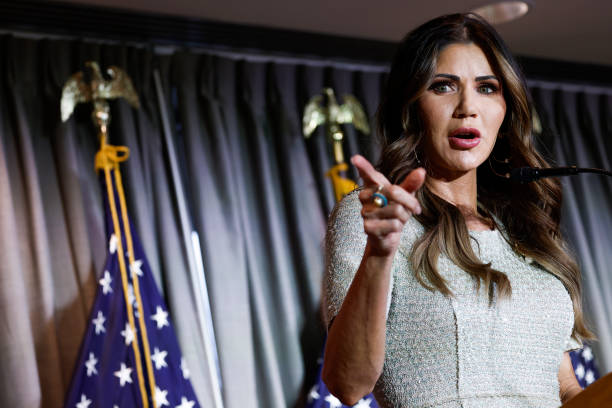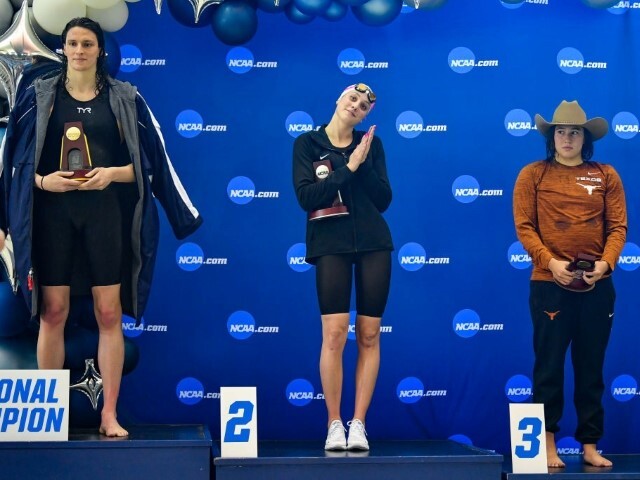NCAA President Charlie Baker has waived off responsibility in the wake of a letter sent by several Republican state governors who are pressuring the NCAA to put more limits on male-born transgender athletes competing in women’s sports.
Spearheaded by South Dakota Gov. Kristi Noem, the letter, including signatures from eight other GOP governors, points out that the influx of transgender female athletes in women’s sports is taking away opportunities from “truly remarkable female athletes” all across the nation, according to Real Clear Politics.

South Dakota Governor Kristi Noem gestures as she speaks at the Calvin Coolidge Foundation conference at the Library of Congress on February 17, 2023, in Washington, DC. (Anna Moneymaker/Getty Images)
“The NCAA has the chance to guarantee an environment where female college athletes can thrive without the concern of inequities. We trust that you also want to guarantee just such an environment,” the letter reportedly told Baker.
Instead of replying to the points in the letter, Baker — himself a former GOP gov. of Massachusetts — avoided taking any responsibility on the issue and instead redirected the governors to the NCAA’s Committee on Competitive Safeguards and Medical Aspects of Sports.
To date, eighteen states have passed laws banning or limiting transgender “women” from competing in state-run school sports programs, and several others are in the process of debating similar laws. Naturally, they are all under threat of lawsuits to get them repealed, though a judge in West Virginia recently ruled that the state’s law is lawful and constitutional.
Along with Noem, other signers of the letter include Sarah Sanders of Arkansas, Mike Parsons of Missouri, Greg Gianforte of Montana, Joe Lombardo of Nevada, Kevin Stitt of Oklahoma, Gregg Abbott of Texas, Mark Gordon of Wyoming, and Mississippi Gov. Tate Reeves, the latter of whom is the chairman of the Republican Governors Association’s policy arm.
The NCAA has adopted a “sport-by-sport” policy allowing trans athletes to participate in most, but not all, NCAA sports.
It is a policy the governors oppose because, they say, it “allows the NCAA to avoid responsibility for ensuring the fairness of collegiate sports – therefore, it must be changed.”
Their letter also points out the “fundamental” differences between men and women and insists that “biological men are generally taller, faster, stronger, and have more testosterone than biological women.” This puts trans women at an advantage and “puts women, through no fault of their own, at a disadvantage.”
The letter goes on to relate the experience of NCAA swimmer Riley Gaines, who tied with notorious trans swimmer Lia Thomas in the NCAA women’s championships in 2022, but who was denied a trophy during photo ops on the winner’s platform because NCAA officials gave the trophy to the male-born Thomas.
University of Pennsylvania swimmer Lia Thomas and Kentucky swimmer Riley Gaines react after finishing tied for 5th in the 200 Freestyle finals at the NCAA Swimming and Diving Championships on March 18th, 2022, at the McAuley Aquatic Center in Atlanta, Georgia. (Rich von Biberstein/Icon Sportswire via Getty Images)
“The NCAA has the opportunity to guarantee a fair environment for women’s sports. If you take this opportunity, it will expand the possibilities for so many young women for years to come,” the letter states. “But if you continue the NCAA’s misguided policies, stories like Riley Gaines’ will only become more common.”
For his part, Baker has been very vague on whether he intends to lead on the issue or to avoid the problem by allowing the various NCAA rules committees to handle the issue.
During his testimony before a House committee, Baker tried to speak out of both sides of his mouth on the Lia Thomas issue.
On one hand, he said he would not “defend what happened in 2022” because he “wasn’t there.”
But on the other, he stuck beside the very rules that allowed Lia Thomas to compete like he did in 2022.
“What I will say is, we have very specific rules and standards around the safety and security of all our student-athletes, and anyone who hosts one of our national championships has to accept that they know what they are and then abide by them accordingly,” he said.
Then he made a vague claim that “I don’t believe that policy would be the policy we would use today,” but did not say what would be different, though he claimed the current NCAA rules are more strict now.
“As I said before, the rules around transgender athletes generally are more restrictive today than they were in ‘22. And I can state pretty clearly that no one’s going to get forced into any sort of situation that’s going to make them uncomfortable,” he insisted. “We make that very clear in the guidance that we give to anybody who hosts one of our championships, period,” he said.
“I can tell you that the standards with respect to participation for trans athletes in women’s sports have been adjusted since then and continue to be adjusted based on conversation with other governing bodies,” he averred.
Regardless, NCAA rules still allow trans athletes to participate and to use women’s locker rooms and changing facilities.
Follow Warner Todd Huston on Facebook at: facebook.com/Warner.Todd.Huston, or Truth Social @WarnerToddHuston
